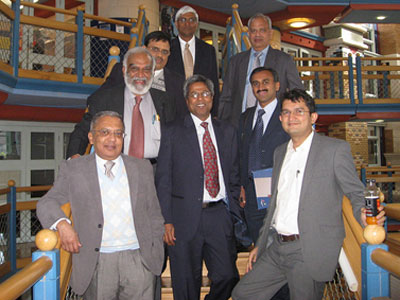30th May 2012 Bangalore, India
Bangalore visits Cambridge
It was very cold and rainy in Cambridge, but the warm welcome we received lifted our spirits! I led a group of academics and entrepreneurs to Cambridge 16 to 20 April to understand the well-known Cambridge Phenomenon first hand, and explore ways to link this great City to the Technology City in India, Bangalore. Both these cities have a lot in common and can learn from each other. They are key technology clusters of their respective countries with focus on knowledge-driven sectors such as biotechnology, information technology, advanced manufacturing and nanotechnology. They also have similar pace, attitude and drive for innovation and entrepreneurship. See photos.
The delegation from Bangalore comprised of well-known researchers and entrepreneurs Prof Rajagopalan, Dr Ashok Kumar Das, Prof K Kumar, Mr Vinay Deshpande, Dr Taslimarif Saiyed, Prof Parameshwar Iyer, Prof T G Sitharam. The aim of the visit was to look for opportunities to create a formal link between the two cities. The visit was very successful; it not only gave us insights into the reasons for the incredible explosion of technology, life sciences and service companies in Cambridge since the 1960s, we also discovered an openness in Cambridge towards collaborating with cities like Bangalore.
The delegates were very impressed with the route to commercialisation of research adopted by the Cambridge University. We met some of the key players from the Cambridge ecosystem such as the 800 year-old Cambridge University, Cambridge Enterprise (CE) and Cambridge Network. CE is responsible for commercialising university research and helps inventors, innovators and entrepreneurs make their ideas commercially viable for the benefit of society, the UK economy, the University and inventors themselves! The other important place we visited was the ideaSpace at Hauser Forum, which forms part of the University’s Entrepreneurship Centre. It acts as a hub for early stage innovation, providing space and resources (including good coffee and ginger biscuits!) to a wide community of innovators at a very affordable price.
The willingness to share information and ideas in Cambridge, and the high degree of networking amongst people and organisations, was striking. Professor Sir Chris Bayly and Dr Shruti Kapila, distinguished scholars of Indian history, were kind enough to host us for a wine reception on the first evening. We were also fortunate to discuss the Phenomenon with David Cleevely, who has built and advised many companies in Cambridge, and Prof. Jaideep Prabhu of the Director, Centre for India & Global Business, Judge Business School.
Throughout the week, the delegates met various people, based on their own interests, to assess opportunities for collaboration with Bangalore’s ecosystem. These included European Bioinformatics Institute, Cambridge Cleantech, Dr Mark Priest of UKTI, Arun Muthirulan and Uday Phadke of AcceleratorIndia, OneNucleus, Centre for Science and Policy, and Cambridge Carbon Capture. Two of the delegates were very lucky – Rajagopalan was presented a Raspberry Pi (a tiny low cost computer) by none other than the inventor himself and Vinay was gifted an innovative projection device by Light Blue Optics.
The icing on the cake of the visit was a dinner on the final day with Mr. Charles Cotton, who has seen the Cambridge Phenomenon at close quarters and is behind the colourful coffee table book: Cambridge Phenomenon: 50 Years of Innovation and Enterprise. This special dinner at St. Catherine’s College was hosted by Prof Shailendra Vyakarnam, Director of the Centre for Entrepreneurial Learning. Shai’s been a huge support, generously sharing his ideas and wisdom to get this initiative going. We had some excellent vegetarian food to warm us up on chilly evening in Cambridge.
We were overwhelmed by the high level of interest and the number of initiatives that can be taken up. The challenge is to translate these into action and realise the research and economic benefits of this collaboration, both in Bangalore and Cambridge. A lot of conversations and plans are already underway, more on this later.

Dear Sunil,
Good to see you there and nice to hear you are with Science and Innovation Network. Ofcourse your presence will bring value added services based on the experience you have.
Wish you all the best…!!
Regards,
Muniraju
That is fabulous! A great initiative taken up by the distinguished fellows. They must definitely look forward in this regard and collaborate Bangalore with Cambridge as both of them are dynamic towns of their region.
Hi Sunil, A very informative and reflective write-up. You have nicely captured most of the happenings during our visit, and set the tone for the future plans and actions.
Hope to see the Bangalore – Cambridge Network bloom and flourish.
Prof Parameshwar P. Iyer